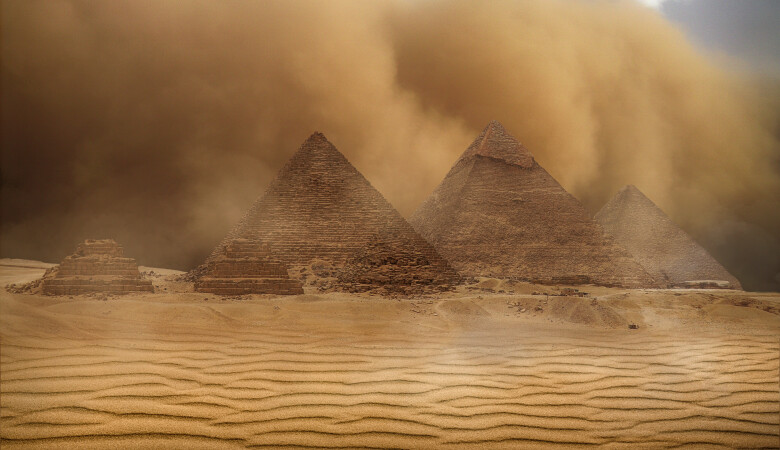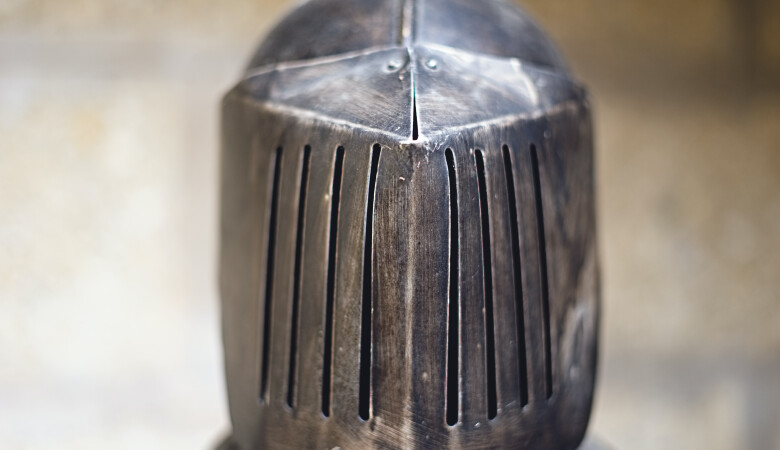The Merchants of Tyre Stripped of their Glory (Isaiah Sermon 24 of 80)
August 26, 2012 | Andy Davis
Isaiah 23:1-18
Judgment, Prophecy
Pastor Andy Davis preaches a verse-by-verse expository sermon on Isaiah 23:1-18. The main subject of the sermon is God's promise to strip the prideful of their glory as a consequence of their sin.
- SERMON TRANSCRIPT -
I. Introduction
I’d like to ask if you would turn in your Bibles to Isaiah Chapter 23. This morning we’re going to be looking at this oracle in Isaiah 23. While you’re at it, I wouldn’t mind if you would also flip over to Ezekiel 27. We’re going to be looking at things from Ezekiel 26, 27, and 28 as well for more details about Tyre. Take the time to go there. But our home base this morning is Isaiah Chapter 23.
When our Lord and Savior, Jesus Christ was beginning His public ministry, the Lord led Him to be baptized by John. Immediately after that, He was led by the Spirit into the desert where He was tempted by the Devil for forty days. In one of those temptations, the devil took Him to a very high mountain and showed Him in an instant all of the kingdoms of the world and their splendor. I don’t know how he did that. But in some way, he made all of the glory of the world flash by Jesus’ eyes, immediately and quickly, on that high mountain. A vision of the world, of its kingdoms, of the glories of those kingdoms, in an instant. Then he said, “All of this has been given to me. I can give it to anyone I want to. It will all be yours, if you will just bow down and worship me.”
You know very well that the Lord did not do that. He said, “Away from me, Satan, for it is written, ‘Worship the Lord your God and serve Him only.’” But I was thinking about that passage this morning, and how it is that the devil had the kind of power to be able to cause all of the glory of various kingdoms of the world to flash before Jesus’ eyes in an instant. I was thinking that the Word of God, frankly, has a similar power. Maybe not in an instant, but we can be transported geographically. We can move from wherever we are to a distant location. We can actually move across time as well. We can be put in distant places and distant times by the Spirit of God through the Word of God. We can learn the lessons of history. We can learn spiritual lessons from what God has done in history. That’s what’s going to happen today. By the power of the word of God, by the power of the Spirit, we’re going to be transported from First Baptist Durham. We’re going to sit by a harbor in the harbor city of Tyre. We’re going to learn the lesson. Maybe we’re going to look over it as it burns, as it smolders, as it’s being conquered by army after army. We’re going to seek to learn the spiritual lessons that God has for us to learn concerning the fall of Tyre.
We’re in this section of Isaiah in which he’s dealing with oracles against the nations. So you see here in 23:1, an oracle, sometimes translated as a burden, concerning Tyre. This is the tenth of ten such burdens, one after the other, from Isaiah 13 up through 23. We’ve had one oracle, or burden, against one nation after another. This is the tenth and final one, a specific burden, or oracle, against a nation or city on earth. The first of these was in Isaiah 13, an oracle or burden against Babylon. Then we went through a series of them, one after the other, whether Edom or Moab or Philistia or Damascus, Arabia; one after the other. Now, at last, we’ve come to the final one, the tenth, and it’s this oracle against Tyre.
II. Tyre Described: A Wealthy Merchant City
Two Patters of World Dominance: Military and Economic
It’s fascinating, as you consider the bookends of these oracles: the oracle against Babylon and the oracle against Tyre. There are two different kinds of power being dealt with in those two cities. With Isaiah 13, the oracle against Babylon, you have military conquests. You have the power to build an empire by military means. The power of Babylon is the power to conquer, to rise up and build a military machine that can steamroll one nation after another and build a mighty empire. It’s pictured in Daniel Chapter 7 as a series of beasts or animals, beasts that come up out of the sea, one after the other. All of them have the power to crush and devour their enemies and their neighbors. That’s the power of Babylon.
What was Tyre?
Isaiah 23 deals with the power of Tyre. It’s a very different kind of power. It’s economic power. The merchants of Tyre are not trying to dominate their neighbors. They’re trying to befriend them. They’re trying to shake their hands and smile at them, not because they care about them, no, but because they want to get their money. You can picture a used car salesman here. Nothing against used car salesmen, you can get into trouble with these illustrations. I’m not saying anything about that, but you picture a guy who’s trying to build a relationship. He’s trying to do it to gain worldly influence for the sake of money. So the Lord speaks these oracles against Babylon, against Tyre, and amazingly, the same word is spoken against each, and for the same reason. The Lord is going to lay these lofty cities low and He’s going to do it to humble the pride of all human glory. Whether a military glory, a military empire, or an economic one, all lofty towers and every high, stately trading ship, everything, every high lofty mountain will be leveled and made low. The Lord alone will be exalted in that day. All the idols will totally vanish. He is sweeping away idols here.
Tyre is described in Isaiah 23 as a wealthy merchant city. Look at verse 3. It says, concerning Tyre, that she became the marketplace of nations. Think of a Super Walmart, only bigger. Okay? A place where you can buy the stuff of this world. In verse 8, it says that Tyre’s merchants are princes whose traders are renowned or esteemed to the distant places of the earth. As a matter of fact, in verse 7, it speaks of far off lands. Look at verse 7. It says these people’s feet have taken her to settle in far off lands. Tyre was a city on the eastern Mediterranean coastline that was established for trade. It was established twenty-eight centuries before Christ by the Phoenicians. It had a seafaring people. The city itself was made up of two cities: a land-based city and then, just offshore, a pair of islands in the harbor of Tyre. These people were merchants. They sent out colonies for the sake of trade all over the eastern Mediterranean and eventually throughout the Mediterranean. For example, Carthage was a colony of Tyre. They were planted centuries before Rome came to ascendancy, and then they gave Rome a lot of trouble. Carthage eventually had military aspirations. You’ve heard the story of Hannibal and his elephants and how close they came to conquering Rome. Well, they were a colony of Tyre originally. Some scholars believe Tarshish, which is as distant from Tyre as you can be in the Mediterranean, in the western part of the Mediterranean in Spain, was also a colony.
Tyre a Fortress
Tyre is described as a fortress. It was very, very difficult to conquer, both the land-based city and the harbor-based city. You can picture Alcatraz, for example, an island, a rocky island, just offshore. Both of them had high, lofty protected walls. So the word “fortress” is used here. If you look at verse 11, it concerns the fortress, and the decree is that her fortresses, plural, be destroyed. Again, in verse 14, your fortresses are destroyed. So it’s a very powerful place, very, very difficult to conquer. It’s difficult to conquer because one of the things you do with a walled citadel is you surround it and starve it to death. Well, that just can’t happen with this merchant city. They’re very good on the water, and they can be constantly resupplied by their colonies. So you can’t starve them to death. There’s no chance. You can’t actually even get to the island fortress. If you don’t have a navy, you have no chance of subduing it, none. So it’s very, very difficult to conquer. This is Tyre, wealthy merchant city.
Initially a Good Relationship with Israel
We know through the Bible of the good relationship that both David and Solomon had with Hiram, King of Tyre. Hiram sent cedars of Lebanon down (not for free, by the way) and sold them to David in exchange for some wheat. This is what they did. His son, Solomon, was able to build his palace and also the temple of God from trade with Tyre. This is the power of this incredible city. Put your finger here in Isaiah 23, turn over to Ezekiel 27, and you have a sense of the widespread trade of Tyre. Look at Ezekiel 27:12-23. It says, “Tarshish did business with you because of your great wealth of goods; they exchanged silver, iron, tin and lead for your merchandise. Greece, Tubal, and Meshech traded with you; they exchanged slaves and articles of bronze for your wares. Men of Beth Togarmah exchanged work horses, war horses and mules for your merchandise. The men of Rhodes traded with you, and many coastlands were your customers; they paid you with ivory tusks and ebony. Aram did business with you because of your many products; they exchanged turquoise, purple fabric, embroidered work, fine linen, coral and rubies for your merchandise. Judah and Israel traded with you; they exchanged wheat from Minnith and confections, honey, oil and balm for your wares. Damascus, because of your many products and great wealth of goods, did business with you in wine from Helbon, and wool from Zahar. Danites and Greeks from Uzal bought your merchandise; they exchanged wrought iron, cassia and calamus for your wares. Dedan traded in saddle blankets with you. Arabia and all the princes of Kedar were your customers; they did business with you in lambs, rams and goats. The merchants of Sheba and Raamah traded with you; for your merchandise they exchanged the finest of all kinds of spices and precious stones, and gold.” You get a picture of the vast wealth of Tyre and the widespread nature of their trade, their colonies. The oracle begins in verse 1 with ships of Tarshish from Spain, as far away from the eastern Mediterranean cities of Tyre and Sidon as you could be. They’re making their way. They’re sailing across the Mediterranean. Their bows are pushing the water aside, the wake is trailing behind them, and they haven’t heard yet. They haven’t heard the news. It’s not until they get to Cyprus, which is a big island in the eastern Mediterranean, that they finally hear: Tyre is destroyed. There’s nowhere for you to bring your cargo. You have to go to a different place. Tyre has been destroyed.
It’s actually very dramatic. It’s how, if you are a producer making a movie of this chapter, you’d begin. Those ships of Tarshish sailing back to Tyre and they hadn’t heard the news yet. The news hasn’t come. So Tyre is described as a wealthy merchant city.
III. Tyre Exposed: A Satanic Stronghold
Ezekiel 26-27: Major Sections of Prophecy Against Tyre
Secondly, we learn from Ezekiel rather than in Isaiah 23, that Tyre is exposed as a satanic stronghold. Really what we get here (and this is why I began this sermon as I did with Jesus and Satan), is that behind Tyre’s economic might and power, there is a malevolent force, a dark demonic force. Satan is there. Again, you’re not going to get this from Isaiah 23, but you’re going to get it from Ezekiel 28. So go over to Ezekiel 28. There you’re going to see an amazing thing. Ezekiel 26 and 27 describe Tyre as an actual city, a real place up in the north of Israel, a coastline city that carried on trade. There are various words of woe and lamentation spoken concerning Tyre and Sidon.
Ezekiel 28: A Lamentation Against the “King of Tyre”
But in Chapter 28, we have this prophecy directed against the King of Tyre. The language of this prophecy reaches a spiritual level that’s very difficult to align with just a human king. It begins in verse 12. Ezekiel 28:12-19 says, “Son of man, take up a lament concerning the King of Tyre and say to him: ‘This is what the sovereign Lord says: ‘you were the model of perfection, full of wisdom and perfect in beauty. You were in Eden, the garden of God; every precious stone adorned you: ruby, topaz and emerald, chrysolite, onyx and jasper, sapphire, turquoise and beryl. Your settings and mountings were made of gold; on the day you were created they were prepared. You were anointed as a guardian cherub, for so I ordained you. You were on the holy mountain of God; you walked among the fiery stones. You were blameless in all your ways from the day you were created til wickedness was found in you. Through your widespread trade you were filled with violence, and you sinned. So I drove you in disgrace from the mount of God, and I expelled you, O guardian cherub, from among the fiery stones. Your heart became proud on account of your beauty, and you corrupted your wisdom because of your splendor. So I threw you to the earth; I made a spectacle of you before kings. By your many sins and dishonest trade you have desecrated your sanctuaries. So I made a fire come out from you, and it consumed you, and I reduced you to ashes on the ground in the sight of all who were watching. All the nations who knew you are appalled at you; you have come to a terrible end and will be no more.”
Two Prophecies About Satan in the Old Testament
Friends, how could this be talking merely about an earthly king? He was in the garden of God. He was in Eden. He was on the mountain of God. He was exalted. He was perfect in beauty. He was in some way holy and pure on the day he was created, until wickedness was found in him. Many scholars believe that this is speaking of the fall of Satan. As a matter of fact, probably the greatest single unanswerable question in theology is how it was that wickedness was found in Satan to begin with. Where did it come from? There is no answer. It just happened. In some way, God gave him the freedom to become wicked, though the wickedness did not come from God. He was cast down. He was expelled from the mountain of God, thrown down to the earth. I mean, you’re reading through these verses and you know you’re not talking about a human king any more. Amazingly, the same kind of thing happens in Isaiah 14. Right after the oracle against Babylon, the prophet turns his guns on the King of Babylon and uses the same type of language. He said, “I will ascend to the mountain of God. I’ll make myself like the most high.” All this lofty language, but he will be thrown down. Same message.
God is Not Deceived
They have the same king, friends. Babylon and Tyre have the same king. He loves to hide himself behind human puppets, behind the human kings that he is the puppet master of and to orchestrate their comings and goings and their dealings, whether their military conquests or their widespread trade. In their love for the things of the world, behind all of it is Satan. He’s unmasked by the Word of God. It makes perfect sense because he doesn’t reveal himself openly as who he is. He doesn’t come to Eve in the garden and say, “I’m Satan. I’m here to destroy your world.” He comes disguised. He comes clever. He’s not what he appears to be. He disguises himself as an angel of light. He’s attractive; he’s alluring. That’s the danger for us. Would we do as well as Jesus if we were shown all the kingdoms of the world and their splendor? Well, Satan’s not offering that to peons like you and me. He’s just offering us a small portion of it. Just a little bit of the glory of the world, just a little taste, and that will probably be enough for many of us. He needs to be unmasked, dear brothers and sisters. We need to see behind Tyre and see what’s going on. Because in our text, Tyre’s destroyed, but the spirit of Tyre lives on. It’s going to continue right to the end.
In Revelation 18, this vast trade city of Babylon gets thrown down in the ocean, and we have the same kind of perspective. The distant people who can’t trade with it any more are standing far off and wailing and lamenting over its fall. It’s the same type of thing. The spirit of Tyre lives on because it’s what Satan is doing. He must be unmasked. We must see him for what he is. We must understand that he is standing there offering us the world. He’s offering you the world if you’ll only trade your soul for it. And it’s Jesus alone who speaks wisdom to us, saying, “What would it benefit you if you would gain the whole world and lose your soul?” What would you give, what portion of the world would you give, in exchange for your soul? Or reversing it, what portion would you hold on to, saying, “That’s too expensive. I’ll go ahead and lose my soul?” Jesus is speaking wisdom across how Satan is lying to us about Babylon and Tyre.
Judgment from God will fall on all of it
We have to see him unmasked, so that’s Tyre exposed as a satanic stronghold, truly. Go back to Isaiah 23. We have the oracle now, and we face it full on. The oracle is against Tyre and its satanic overlords. Tyre will be destroyed. By the way, it’s interesting, the King of Tyre, his future is to burn. If you look at that, fire is going to come out and consume him. You read about it in Revelation 20, when at last the devil is thrown into the lake of fire where he will burn forever and ever. As we know from the story of the sheep and the goats, Jesus says, “Depart from me, you who are cursed, into the eternal fire, prepared for the devil and his angels.” That’s the King of Tyre. That’s where he’s going. A fire will consume him forever.
IV. Tyre Destroyed: A Divine Punishment
The Punishment Declared by Isaiah the Prophet
So judgment is decreed against Tyre, and we have this oracle of judgment. Look at Isaiah 23:1 again. “Wail, O ships of Tarshish! For Tyre is destroyed.” It’s an oracle of destruction. You have it again in verse 11, where he has given an order concerning Phoenicia, that her fortresses be destroyed. It’s an oracle of destruction. Again in verse 14, it says, “Wail, you ships of Tarshish; your fortress is destroyed!” So the question comes: who planned this against Tyre and why? They’re friendly people. They’re easy to like. They’re very likeable veterans. When they come to your town, you’re going to like them immediately. They’ll slap your back. They’ll shake your hand. They’ll give you a hug. They’ll sell you what they have to sell. Why destroy them? What’s wrong? And who would plan such a destruction and for what reason?
On one level, we could say that who planned it are the military conquerors that are coming one after the other. The Assyrian kings planned it. Nebuchadnezzar planned it. Alexander the Great planned it. Well, they had their own plans. But God is the one that really planned it. And God is going to bring these nations, one after the other. It’s clear in Ezekiel 26 (you don’t have to go there), where he likens it to wave upon wave. The Lord is going to bring nations, plural, against you, O Tyre. You get the feeling of crashing waves, like tidal waves, just smashing Tyre one after the other, not all at once.
The Punishment Described in Greater Detail in Ezekiel 26
In 701 BC, it’s the Assyrians. They come and they conquer the land-based city. I told you that the island fortress is very, very difficult to conquer. They couldn’t do it. Then Nebuchadnezzar came over a century later. He did the same thing. He leveled the land-based city but could not conquer the island city. As a matter of fact, God, through His prophet, actually said, “You know, Nebuchadnezzar and Babylonian army, you guys worked really hard and you didn’t get much. So I tell you what, I’m going to give you Egypt.” That’s about the spirit of the oracle there. Every head was rubbed bare, every shoulder was rubbed bare, and what did you get? You got nothing. It slipped away in the night by ships of Tyre and you got nothing for it. You got no pay. You’re doing my will, so I tell you what, I’m going to give you the grain of Egypt, of the Nile.
Then along comes Alexander the Great. They don’t call him Alexander the Great for nothing. He’s a man of great ego, a man of great ability, a man of great ambition. He says, “All right, I know that the land-based cities have been conquered before. I know I can do that. I want that island city.” And he tried and he tried and he tried. He built the causeway out to the island using the rubble from the destroyed city on land. He strapped it into the harbor and started to build up a causeway. This is an ambitious man, he’s not to be deterred.
The problem is you’re approaching a walled fortress, a citadel. They’re shooting at you with arrows. They’re able to come out at night and destroy the work you’ve done. The ships are able to come and fire at you and you can’t really do much to them. Alexander finally realized, “I’m not doing this without a navy. I’ve got to have a navy.” So what does he do? He recruits the area ships to be his navy, and he conquers the city, levels it. At last the prophesies in Ezekiel come true. “I’ll scrape it bare like a rock and there fishermen will dry their nets. It’ll be a small village.” There’s a picture of it on the cover of your bulletin. There’s nothing there. Imagine a vast economic trading center like New York City, if the Lord tarries, one hundred years from now being a small fishing village. That’s about how shocking it was what happened to Tyre.
The Punishment Decreed by Almighty God
So Tyre would be destroyed. It says clearly in Isaiah 23:8-9, “Who planned this against Tyre, the bestower of crowns, whose merchants are princes, whose traders are renowned in the earth? The Lord Almighty planned it, to bring low the pride of all glory and to humble all who are renowned on the earth.” God did this. Yes, he used Sennacherib. Yes, he used Nebuchadnezzar. Yes, he used Alexander the Great. But they’re all dead.
The Reason for the Decree: The Humbling of All Human Pride
No, this was God’s plan and His reason is plain. He wants to humble all mankind. He wants to lay the lofty city down low. He wants to crush human pride because at the root of all of this is idolatry. It’s worshipping and serving the created thing rather than the creator who should be forever praised, amen. God will not have it.
Our God is a jealous God and He will not have your heart going affectionately after the things of this world. So He crushes Tyre, even though they’re really nice guys who seek to be your friends, but not for free. He wants to crush it because He’s bringing low the pride of all glory. He’s humbling all idols. Tyre is destroyed as a divine punishment and as a warning to nations like us who come later, who have our own marketplace, our own economic ambitions, our own widespread trade, our own interests in the mighty dollar. It’s warning us to not be drawn into the marketplace of the nations and not to live for the almighty dollar, not to live for the merchandise. It’s listed there in Ezekiel 27 and Revelation 18, all of the stuff that you can get at Walmart or even Super Walmart. God destroys Tyre to warn us to not live for those things, to warn us against it and to humble us.
The Time Span of the Decree: Carefully Measured Out
The glory of this chapter is that it doesn’t ultimately end with woe and disgrace for Tyre. Jesus will have His remnant from every nation. He will have His converts. The prophecy is very clear, if you look at verses 15-18. At the end of seventy years, the span of a king’s lifetime, the time of the exile to Babylon, Tyre’s going to be rebuilt. Tyre will again ply her trade with the nations and act like what she is, a prostitute who walks through a city, strums on her harp, and sings a song, an alluring song to try to get customers to come and trade with her and buy her wares. So she’s going to regain her place as a prostitute of the nations. She’s going to regain her trade among the nations. But ultimately, as Ezekiel makes plain, one nation after another will come and finish the job.
The Profits of Tyre will Ultimately go to the Godly
And yet, it says in verse 18, her profit and her earnings will be set apart for the Lord. They will not be stored up or hardened. Her profits will go to those who live before the Lord for abundant food and fine clothes. Friends, this is the best reason why you should not marry the world now. You’re going to get it after the resurrection anyway and it’s going to be far more beautiful then. It’s going to be resurrected itself. It’s going to be glorious. The meek will inherit what? What are they going to get? The earth. After all of the corruption’s over, after the decay is ended, after the resurrection, the meek will inherit the earth, the resurrected new earth and the new heaven. That’s why it says in Romans 4:13, “It was not through law that Abraham and his offspring received the promise that he would be heir of the world.” If you’re a child of God, if you are a son or daughter of Abraham, your title is “heir of the world.” What do you need it for now anyway? Now, God may give you some of it now to advance His kingdom, and so you can wear clothes and eat and have what you need. The money will come to you so that you can use it for His kingdom.
V. Tyre Evangelized: A Triumph for Christ
Tyre More Bearable on the Day of Judgment than Capernaum
Jesus will have His trophies. He will have His victories, even in Tyre. Remember what He said in Matthew 11:21. He was talking about Korazin and Bethsaida where all of His miracles had been done, “Woe to you, Korazin! Woe to you, Bethsaida! If the miracles that were performed in you had been performed in Tyre and Sidon, they would have repented long ago in sackcloth and ashes.” They were ready to hear the gospel. As a matter of fact, some of them did hear the gospel from Jesus. In Luke Chapter 6, He was preaching in a wide plain area and many people came from that region of Israel and Judea and also from Tyre and Sidon had come and listened to Him preach, and brought their sick so that He could heal them.
Tyre Visited by Christ, the Syro-Phoenician Woman
Even more remarkable is in Matthew 15, where Jesus is walking through the streets of Tyre, and a Syro-Phoenician woman, a woman of Greek descent born in Phoenicia, came up. She’s a woman whose daughter was suffering terribly with demon possession. She’s crying out after Jesus. Jesus ignores her, doesn’t answer a word. The disciples aren’t really her advocates at that point. They say to Jesus, “Send her away. We’re sick of listening to her.” She’s really the picture of the persistent widow at this point. She will not be sent away. I get the picture that she comes and stands right in front of Jesus. Do you get that picture? “I’m not going home. You must deal with me.” Remember what Jesus said to her? “It is not right to take the children’s bread and throw it to the dogs.” It’s one of the toughest things Jesus ever said to anybody.
But He knew her. He knew her heart. In effect, you don’t come into the kingdom without getting humbled. At that moment, if she had gotten a little prideful, raised her chin a bit and said, “I’m no dog,” and walked away, what would she have gotten from Jesus? Nothing. But what does she say? She said, “Yes, Lord. But even the dogs get the crumbs that fall from their master’s table. Isn’t there something that can fall off for me?” And Jesus said, “Woman, you have great faith. Go home. You will find your daughter healed.” Isn’t that marvelous? What a sweet story. Jesus will have His remnant, if they’ll just come to Him humble and by faith and trust in Him. He will do a better healing than that. He’ll heal them of sin. He’ll heal them of death. He’ll give them resurrection bodies. They’ll live forever in that world I just described to you, that resurrected world, that new heaven and new earth. Live forever, you descendant of Tyre. You inhabitant of Tyre and Sidon, that’s where you live. You live in Super Walmartville. You need to find yourself in this chapter and say, “I’m not going to get sucked down the drain of Tyre. I don’t want to live there. I want to separate myself from it. I want to be pure and holy from its defilements.”
The Last Mention of Tyre: Acts 21
The last time Tyre shows up in the Bible is in Acts 21, when Paul is en route to Jerusalem where he will be arrested and put on trial for the gospel. Just before he gets there, he stops in the vicinity of Tyre and Sidon. Some disciples from that area come to meet him. Isn’t that sweet? The disciples of Tyre. These are Christians. It’s just incredible. They’re begging Paul not to go to Jerusalem. They’re convinced he’s going to be arrested there, which he will be. But they see that Paul will not be deterred and so they accompany him out. They kneel down on the beach; they pray with him; and they hug him and tearfully say goodbye to him. That’s the last time you see Tyre in the Bible. Isn’t that incredible? God will have His remnant from every tribe and language and people and nation. In the end, Jesus gets what He wants.
VI. Application
So, application to us. What do you get out of this chapter? First of all, the easy thing to do is to say, “I get nothing. This is some weird oracle about some city that got destroyed centuries ago and it doesn’t have anything to do with me.” Well, look again, friend. Look again. We do live in Tyre. The spirit of Babylon, the spirit of Tyre, whatever you want to call it, it’s still here. Satan is still roaming the earth. He’s still laying traps for your feet. He’s still speaking to your soul, giving you a small portion of the world, not the whole thing like he did with Jesus. He’s luring you with a little part of it. He’s trying to win your heart. He’s trying to win your affections with things that money can buy.
Come to Christ!
We are among the wealthiest people that have ever lived on the face of the earth. We are held accountable for all our stuff. So for me, the application is the same as it always is. I need to run to Christ. I need to flee to Jesus. I need to know that the blood of Jesus, His blood shed on the cross, His resurrection from the dead, is the only hope I have to escape the future judgment that’s coming on whatever Tyre there is when Jesus returns. I need to flee the wrath to come. And I can by running to Jesus, because He has absorbed the wrath to come for me. I can find a refuge in Jesus if I just, by faith, cry out for Him to be my savior. Maybe you came here today just to hear this message right now. You can say, “What must I do to be saved? I know I’m materialistic. I know I’ve been living for money. I know I’m living for the worldly pleasures of this world. I know that it has a lure on my heart. I want to be free but how do I do it?” Come to Christ. Jesus has the power to free you, to save you from all of your idolatry, from the friendship of the world that is adultery toward God (as James 4 puts it). He has the power to deliver you from that. Come to Christ, look to Jesus. You don’t need to do anything. You just need to believe and trust.
Do Not Love the World
For the rest of you who know that you’re forgiven, you know in your heart that Tyre has power over you. You know it, don’t you? You can feel the lure of it, the lust of the eyes, the lust of the flesh, the boastful pride of life. It’s a magnetic pull on you and it’s hard to resist. It’d be good for you just to acknowledge it, to admit that you have sometimes slept with the prostitute, worldliness, that your heart has been lured away from sincere and pure devotion to Christ and that you went after worldly things. Confess it, as the text says. Wail over it. Be ashamed about it and turn away from it and hate it, as I talked to you about it last week. Genuine repentance.
Do not love the world and do not love the things of this world. If anyone loves the world, the love of the Father is not in him. The battle against worldliness is one of the hardest and most challenging to define. What is worldliness? Do I have too much stuff? Am I making too much money? Do I buy too many things? Do I need to get rid of some things? These are hard questions, and the text makes us face them. Scripture makes us face them. I can’t answer for you. When the elders, the leaders of a church answer for you, that’s a cult, dear friends. You will have to answer for yourself. But the question stands in front of you. My job is to put the question in front of you. It’s your job to answer. Are you worldly? Have you bought too much stuff? Are you living too much for the things of this world? Does God want you to free up more of your resources for the advancement of the kingdom? For the relief of the poor and needy? That’s a question you have to face. The scripture will help you face it. Keep it in front of you for the rest of your lives.
So, I end with this. In I Corinthians 7:29-31, in the marriage section, Paul says something interesting. He says, “From now on those who have wives should live as if they had none.” Friends, don’t go too far with that, okay? Don’t misunderstand that. What he’s saying there is that those who use the things of this world should do so as if not engrossed in them. Being engrossed in the wares of Tyre is materialism, which is greed or covetousness, which is idolatry. It says it multiple times.
Say it, “Lord, search me and know me. Am I using the things of this world appropriately or am I engrossed by them? And if I am engrossed, oh God, I am your child. I know that. Deliver me from Tyre that I may not share its judgments.” Close with me in prayer.
Prayer
Father, I thank You for this warning against Tyre. I thank You for what You did in history. Thank You for the fact that, by the Word of God, we can travel across the centuries back to when Alexander the Great scraped that city into the sea and made it a bare rock where fishermen dried their nets, so we can learn the spiritual lessons, not just study it as secular historians. We can learn the spiritual lesson that says there is a future judgment coming on Babylon and Tyre in Revelation 18. It will be thrown into the sea and heaven will celebrate at that point. Oh Lord, help us to understand that celebration, to embrace it, and to live not as worldlings but as true spiritually-minded sons and daughters of the living God. I pray in Jesus’ name. Amen.































